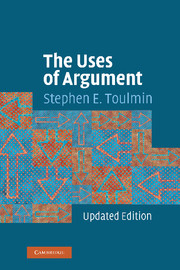Book contents
- Frontmatter
- Contents
- Preface to the Updated Edition
- Preface to the Paperback Edition
- Preface to the First Edition
- Introduction
- I Fields of Argument and Modals
- II Probability
- III The Layout of Arguments
- IV Working Logic and Idealised Logic
- V The Origins of Epistemological Theory
- Conclusion
- References
- Index
V - The Origins of Epistemological Theory
Published online by Cambridge University Press: 05 June 2012
- Frontmatter
- Contents
- Preface to the Updated Edition
- Preface to the Paperback Edition
- Preface to the First Edition
- Introduction
- I Fields of Argument and Modals
- II Probability
- III The Layout of Arguments
- IV Working Logic and Idealised Logic
- V The Origins of Epistemological Theory
- Conclusion
- References
- Index
Summary
The status of epistemology has always been somewhat ambiguous. Philosophers' questions about our claims to knowledge have often appeared to be of one kind, while the methods employed in answering them were of another. About the questions, there has been a strong flavour of psychology, the epistemologist's object of study being described as the ‘understanding’, the ‘intellect’, or the ‘human reason’: on the other hand, if we take psychology to be an experimental science, the methods used by philosophers in tackling these questions have only rarely been psychological ones—until recent years, when Piaget began to study methodically the manner and order in which children acquire their intellectual capacities, the development of the human understanding had been the object of little deliberate experimental inquiry. Instead of conducting elaborate scientific investigations and building up their picture of the human understanding a posteriori, philosophers had proceeded quite otherwise: namely, by considering the arguments upon which claims to knowledge can be based, and judging them against a priori standards. Epistemology, in short, has comprised a set of logical-looking answers to psychological-looking questions.
To say this is not to condemn the way in which philosophers have attacked the subject. There are, it is true, some people who talk as though no serious questions whatever could be answered a priori; and who would advocate the massive collection of factual observations and experimental readings as a necessary preliminary to any intellectual inquiry.
Information
- Type
- Chapter
- Information
- The Uses of Argument , pp. 195 - 232Publisher: Cambridge University PressPrint publication year: 2003
